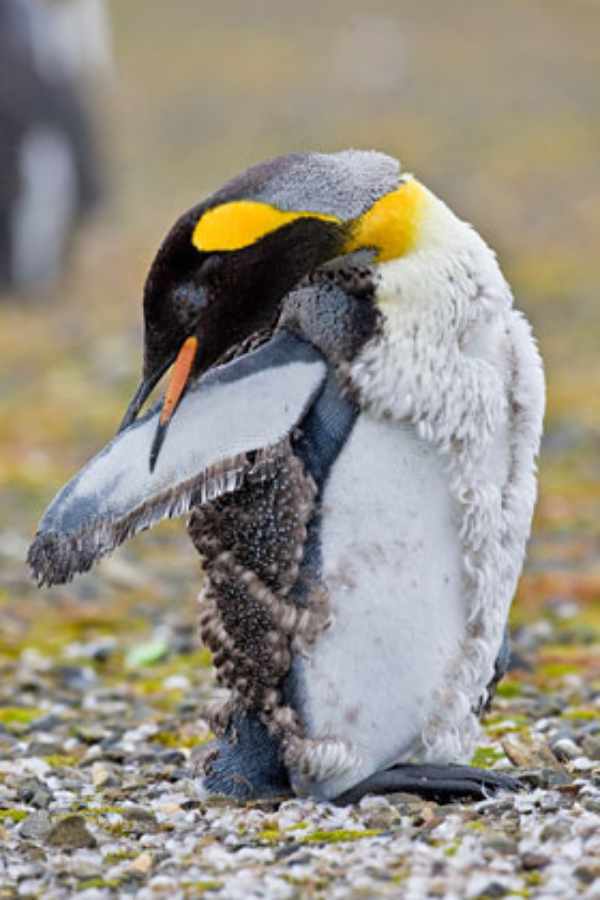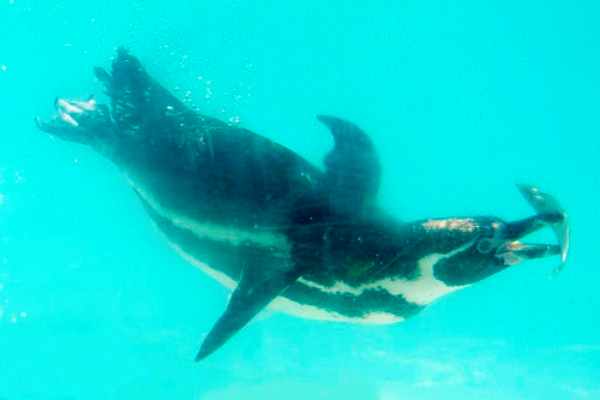Penguins are often seen as cute and harmless creatures that people would love to interact with. However, it is important to keep in mind that despite their adorable appearance, penguins can actually be dangerous. There have been reports of penguins attacking humans, particularly when approached too closely or when their young are threatened.
Table of Contents
Penguins fight with each other using their beaks and flippers, and these are the same weapons that they can use against humans who get too close. It’s always best to admire these fascinating creatures from a safe and respectful distance to ensure both their safety and yours.
So, there you have it, the concise response to the inquiry regarding the potential danger of penguins. However, there are additional aspects to consider. If you desire to explore the extent of their potential threat and learn how to ensure your safety, continue reading for more information!
Are Penguins Dangerous?

These adorable-looking creatures possess the potential to be hazardous if provoked or confronted by humans or other animals. While penguins are generally peaceful birds and do not initiate attacks without reason, there have been instances of penguins defending themselves by engaging in physical altercations with individuals who encroach upon their personal space.
As predatory birds, penguins can pose a threat to those who jeopardize their well-being. However, human encounters with penguins are typically limited due to their natural habitats.
Visitors to penguin-inhabited areas, such as Antarctica, are advised to maintain a minimum distance of five meters from the birds. This precaution ensures that their personal space is respected, reducing the risk of potential attacks.
Although there have been no reported fatalities resulting from penguin attacks, they can cause significant pain through their beak pecks, which may lead to minor bleeding. Additionally, during an altercation, there is a risk of falling and sustaining bone fractures or severe head injuries. Therefore, it is crucial to maintain a safe distance from penguins if you happen to encounter them, prioritizing your own safety.
Are Penguins Aggressive?
Penguins typically exhibit non-aggressive behaviour unless provoked, making it uncommon for them to attack humans or other animals without a valid reason. One common trigger for penguin aggression is approaching them too closely and abruptly. It is advisable to refrain from any attempts to approach penguins, as they may interpret it as a threat and respond defensively.
Maintaining a distance of at least five meters from penguins is strongly recommended. In the event that they approach you, it is best to slowly back away without turning your back to them, ensuring a calm and non-threatening retreat.
These remarkable creatures display a strong protective instinct towards their families, particularly their offspring and nests. While not inherently aggressive, penguins may engage in defensive actions if their young are approached. To avoid any potential conflict, it is essential to keep a respectful distance, especially around their nests. Additionally, when penguins are engaged in attracting a mate, such as building nests or collecting rocks, it is best to steer clear to prevent any perceived threats.
Loud noises can also trigger aggression in penguins as it startles and creates a sense of danger for them. Therefore, it is advisable to speak in soft tones when in their presence and silence camera shutters to avoid causing unnecessary disturbances or alarm.
Do Penguins Attack Humans?
While it is rare for penguins to engage in aggressive behaviour towards humans, there are instances where they may attack if they feel threatened or perceive potential harm.
This typically occurs when humans encroach upon their territory, such as in Antarctica or at zoos, where close proximity can occur. In such situations, penguins may exhibit defensive behaviours by jumping on humans, delivering bites with their beaks, or slapping with their flippers.
Penguins, being carnivorous predators in their natural environment, do not fear the larger size of humans or other animals. They have been observed attacking larger birds and even seals when provoked in their habitat. Similarly, if humans approach them too closely, penguins may display aggression.
A primary reason for penguin attacks on humans is when individuals intrude upon their nests or come too close to their young. Penguins exhibit strong protective instincts towards their offspring, and both male and female penguins may act defensively to safeguard their nests. These nests can be identified by their rock-built structures with a hollow centre, and any proximity to these nesting areas may provoke a defensive response from the penguins.
FAQs
Do Penguins Bite?
Despite their cute and cuddly exterior, these Antarctic birds possess sharp beaks with hooked tips that they use for hunting prey and defending their territory. And yes, penguins do bite – and their bites can be quite severe. It’s not uncommon to see penguins fighting and biting, especially when it comes to protecting their mates from other birds.
When provoked or threatened, these birds are not afraid to use their powerful beaks to inflict serious damage. Due to their curved shape, penguin bites can penetrate deep into the skin and even take off chunks of flesh, making them a force to be reckoned with in the animal kingdom.
Are Penguins Afraid of Humans?
Unlike other animals in the wild, they do not fear humans. This is because they have not evolved in an environment where humans are a common threat. However, this lack of fear can be dangerous. If provoked, penguins will not hesitate to attack humans.
Despite their small size compared to other predators in the Antarctic, they are still hunters themselves and are not regularly hunted by other animals. Thus, they have no reason to fear and will defend themselves if necessary.
Are Penguins Territorial?
Despite their social nature and tendency to gather in large groups, penguins are fiercely territorial when it comes to protecting their nests and young. This protective instinct is deeply ingrained in their behaviour and means that any unfamiliar creature, particularly humans, is considered a threat. If someone approaches too close to where a penguin lives, they are at risk of being attacked by the fiercely protective bird.
Final Words
While penguins are generally not considered highly dangerous, larger species can pose a threat to humans. They can attack by using their beaks and wings, although the resulting injuries are usually not severe. However, an individual can be overpowered and potentially fall, leading to head injuries or broken bones.
In some cases, penguins may continue their aggression and cause more significant harm, particularly to the arms and face. It is not uncommon for penguins to attack in groups, which can escalate the level of danger. In such instances, individuals can sustain serious injuries, including bleeding. The collective force of a group of penguins can easily overpower a person, potentially causing further harm.
To avoid conflicts with penguins, it is advisable for individuals to stay away from their habitats. It is crucial not to disturb their nests or approach their young ones. While young penguins may display curiosity and approach humans, it is best to maintain a distance and refrain from touching them, as this could provoke an attack from the adult penguins.
Reference:
- https://www.pbs.org/wnet/nature/the-world-of-penguins-protecting-penguins/1913/
- https://iaato.org/blog/dont-hug-the-penguins-and-other-rules-in-antarctica-3/
- https://itsweb02.uncw.edu/penguins/Mike2010-11.html
A motivated philosophy graduate and student of wildlife conservation with a deep interest in human-wildlife relationships, including wildlife communication, environmental education, and conservation anthropology. Offers strong interpersonal, research, writing, and creativity skills.










